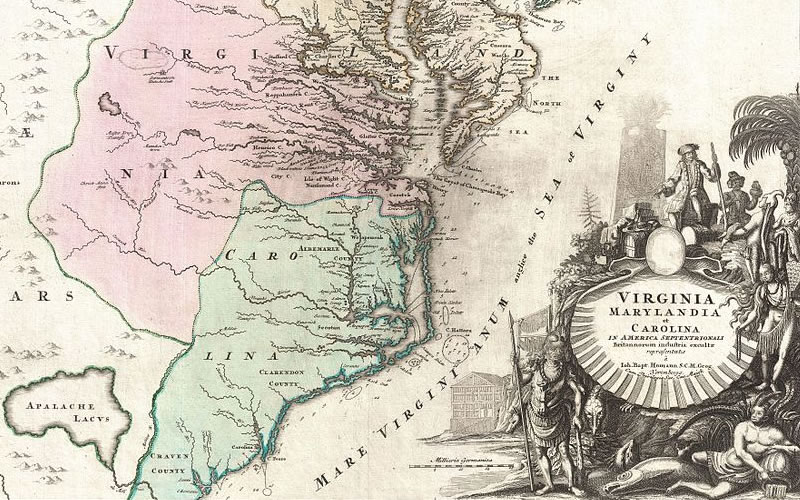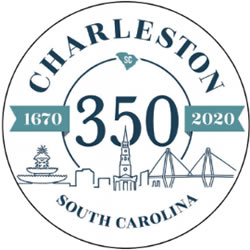
By Andy Brack, editor and publisher | Charleston will have a series of big parties next year as the Holy City celebrates the 350th anniversary of its founding.
 In 1670, English settlers first set up on Albemarle Point along the Ashley River, only to move 10 years later to the peninsula for better health and safety. They built a palisade wall around the settlement to become the only English walled city in what would become the United States, according to historians Jack Bass and Scott Poole.
In 1670, English settlers first set up on Albemarle Point along the Ashley River, only to move 10 years later to the peninsula for better health and safety. They built a palisade wall around the settlement to become the only English walled city in what would become the United States, according to historians Jack Bass and Scott Poole.
You probably know more “Charleston firsts” than you realize. You surely know how patriots won the first decisive battle of the American Revolution on June 28, 1776, with a victory over British land and sea forces on Sullivan’s Island. The victory, which we celebrate annually as Carolina Day, incentivised founding fathers to sign the Declaration of Independence the following month.
You probably know about how the H.S. Hunley was the first submarine to succeed in sinking an enemy ship, the Union warship Housatonic, during the Civil War. The sub, which sank soon thereafter, was discovered in Charleston harbor in 1995 and recovered five years later. It is on display in a North Charleston research facility.
And you may know The Best Friend of Charleston was a steam-powered locomotive that started the nation’s first passenger rail service in 1830. You might not know, however, that it also was the first locomotive to experience a deadly boiler explosion just six months later.
 Charleston is home to the nation’s first museum (Charleston Museum); first opera performance (1735); first theater (Dock Street Theatre, 1735); oldest municipal college (College of Charleston, founded 1770); and the nation’s first Chamber of Commerce, which was organized in 1773. And, of course, the first shots of the Civil War happened near Charleston.
Charleston is home to the nation’s first museum (Charleston Museum); first opera performance (1735); first theater (Dock Street Theatre, 1735); oldest municipal college (College of Charleston, founded 1770); and the nation’s first Chamber of Commerce, which was organized in 1773. And, of course, the first shots of the Civil War happened near Charleston.
Some less widely-known Charleston firsts:
Zoning. Charleston established the nation’s first historic zoning ordinance, which is a big reason why all of the pretty houses remain and attract millions of visitors every year. Tourism’s economic impact to Charleston is $8.13 billion, according to Explore Charleston.
Reform Judaism. Kahal Kadosh Beth Elohim, the second oldest synagogue in the United States, is widely recognized as the birthplace of Reform Judaism. Founded in 1749 by Jews attracted to Charleston for its civil and religious liberties, members built a nationally impressive Georgian home of worship by 1794. Thirty years later, the synagogue’s 47 trustees sought to change the temple’s liturgy to include English translation of prayers, but were denied. They resigned from the congregation and organized “The Reformed Society of Israelites,” whose practices and principles are a big part of today’s Reform Judaism. The congregation’s Georgian worship home burned in 1838, only to be replaced two years later with a building described as “one of the country’s finest examples of Greek Revival architecture.”
Golf. Charleston is considered the birthplace of golf in North America after the formation of the South Carolina Golf Club in 1788. Members reportedly played on a bustling rectangle of land that stretched between what we know as Charleston and Beaufain streets and bounded by Rutledge and Barre streets. The area, called Harleston Green, seemed to disappear from historical records as a golf course around 1800. But that makes sense: Around that time, homes started being built in the area. Interesting tidbit: Some 432 golf balls and 96 clubs arrived in Charleston from England in 1743 as the first known shipment of golf equipment into the colonies.
Finally, we’ll leave you with this one: According to old-time wags and natives who see Charleston as the epicenter of the world, the Atlantic Ocean actually starts in Charleston harbor at the confluence of the Ashley and Cooper rivers. The late U.S. Sen. Fritz Hollings, born in the Holy City in 1922, once told me in his thick Lowcountry accent, “Every great city has a great river. London has the Thames. New York has the Hudson. Washington has the Potomac. And Charleston, Andrew, Charleston has two great rivers — the Ashley and Cooper — and that’s where the Atlantic Ocean starts.”
Charleston’s Founders’ Day Kick-off is set for April 18 at Charles Towne Landing State Park. There will be a summer concert on July 3 and a Community Unity Celebration on Nov. 8, 2020, which we’ll probably need if the 2020 election gets nastier.
Andy Brack’s latest book, “We Can Do Better, South Carolina,” is now available in paperback and for Kindle via Amazon.
- Have a comment? Send to: feedback@statehousereport.com.
















 We Can Do Better, South Carolina!
We Can Do Better, South Carolina!
Another Charleston First is the First Memorial Day in America, held around the old race course at what is now Hampton Park and organized by the African-American churches and the Freedmen’s Bureau, in which three thousand school children and seven thousand free persons of color and recently emancipated slave marched on May 1, 1865. David Blight and other historians have confirmed this as factual and a plaque serves to commemorate the event near the parking lot in the park. More information is available from the Charleston Horticultural Society in their publication ” Layers of the Landscape at Hampton Park”.
great catch Judy. Thanks.